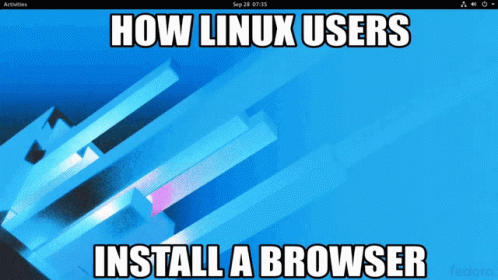this post was submitted on 07 Jan 2024
471 points (79.5% liked)
linuxmemes
21282 readers
1324 users here now
Hint: :q!
Sister communities:
Community rules (click to expand)
1. Follow the site-wide rules
- Instance-wide TOS: https://legal.lemmy.world/tos/
- Lemmy code of conduct: https://join-lemmy.org/docs/code_of_conduct.html
2. Be civil
- Understand the difference between a joke and an insult.
- Do not harrass or attack members of the community for any reason.
- Leave remarks of "peasantry" to the PCMR community. If you dislike an OS/service/application, attack the thing you dislike, not the individuals who use it. Some people may not have a choice.
- Bigotry will not be tolerated.
- These rules are somewhat loosened when the subject is a public figure. Still, do not attack their person or incite harrassment.
3. Post Linux-related content
- Including Unix and BSD.
- Non-Linux content is acceptable as long as it makes a reference to Linux. For example, the poorly made mockery of
sudoin Windows. - No porn. Even if you watch it on a Linux machine.
4. No recent reposts
- Everybody uses Arch btw, can't quit Vim, and wants to interject for a moment. You can stop now.
Please report posts and comments that break these rules!
Important: never execute code or follow advice that you don't understand or can't verify, especially here. The word of the day is credibility. This is a meme community -- even the most helpful comments might just be shitposts that can damage your system. Be aware, be smart, don't fork-bomb your computer.
founded 1 year ago
MODERATORS
you are viewing a single comment's thread
view the rest of the comments
view the rest of the comments

TBF the major reason you get more malware on a Windows is because people build Malware for Windows. It would be silly to aim your attacks towards overly suspicious tech-literate young people with little to take from on the already limited 3% of Desktop market share. If you think Linux Servers are immune to Malware, then OH WOW.
Exactly my point, actually. It's not that it's harder to make malware for Linux, but as a desktop OS, there's just a really small demand for it at this point in time. I don't doubt that when and if Linux gets more mainstream (again, for the desktop) more malware will be produced for it, we're actually already seeing an increase in malware.
But we're also seeing a big change in package distribution for Desktop Linux, mainly with flatpak and more specifically flathub. We're kind of leaving behind our baby stage and becoming more professional and secure when it comes to how software is distributed for our users.
I'm excited to see how our community grows and develops and how we handle challenges that only bigger operating systems have had to deal with.